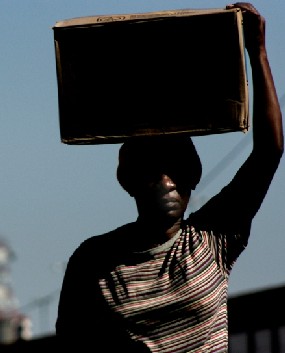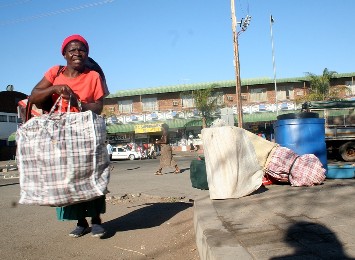|
Southern Africa Gender - Women | Economy - Development | Society Risky business of informal cross-border trade
Although informal cross border traders contribute immensely to the Southern African region - particularly in terms of employment creation, economic upliftment of women, food security, regional economic trade and social integration - they are often invisible: unrecognised at home and harassed in the host country. More than half of informal traders in the world are now women, and yet women traders are especially vulnerable to harassment, abuse, and health risks - including HIV/AIDS.
Traders often spend extended periods away from home in high HIV transmission areas, particularly cross border areas. Here, those who command authority, such as border/customs officials, or those who possess economic resources, such as moneychangers or taxi drivers, may take advantage of the women. Transport and quality accommodation can also be a challenge for many traders who survive on meagre resources. Thus, transactional sexual relationships may arise between female traders and truck drivers in exchange for free transport or opportunity to sleep in the trucks. Furthermore, some female traders end up sleeping in the open, again, exposing them to various vulnerabilities including sexual assault. Moreover, in general, informal cross border traders have limited access to healthcare services, including HIV and AIDS interventions. In most countries, foreigners pay a higher fee for public healthcare services, and thus informal cross border traders may be less inclined to seek treatment while travelling. Few HIV and AIDS interventions are specifically for cross border traders, partially due to difficulties in actually targeting people constantly on the move. Traders are often preoccupied with survival needs, and may not be receptive to HIV and AIDS education and prevention messages. In addition to the objective of raising awareness among stakeholders on the lives of informal cross border traders, the photography project also aimed to build capacity and increase awareness of the participating photographers on issues related to HIV, AIDS and migration. The photographers first received preparatory sensitisation training by IOM on the issues. They then went out and travelled with informal cross border traders, informally interviewing them, and getting to know what their lives are like. While many Southern African citizens benefit from these traders, purchasing their many varied goods, few actually think about what life is like to spend so many days so far from home. The project participants therefore now appeal to all citizens, and especially service agencies, to take into account this largely invisible population. By Reiko Matsuyama Ms Matsuyama is a Project Officer with the Partnership on HIV and Mobility in Southern Africa (PHAMSA) Programme of the International Organisation for Migration (IOM) Pretoria. © afrol News / Gender Links - Create an e-mail alert for Southern Africa news - Create an e-mail alert for Gender - Women news - Create an e-mail alert for Economy - Development news - Create an e-mail alert for Society news
On the Afrol News front page now
|
front page
| news
| countries
| archive
| currencies
| news alerts login
| about afrol News
| contact
| advertise
| español
©
afrol News.
Reproducing or buying afrol News' articles.
You can contact us at mail@afrol.com









